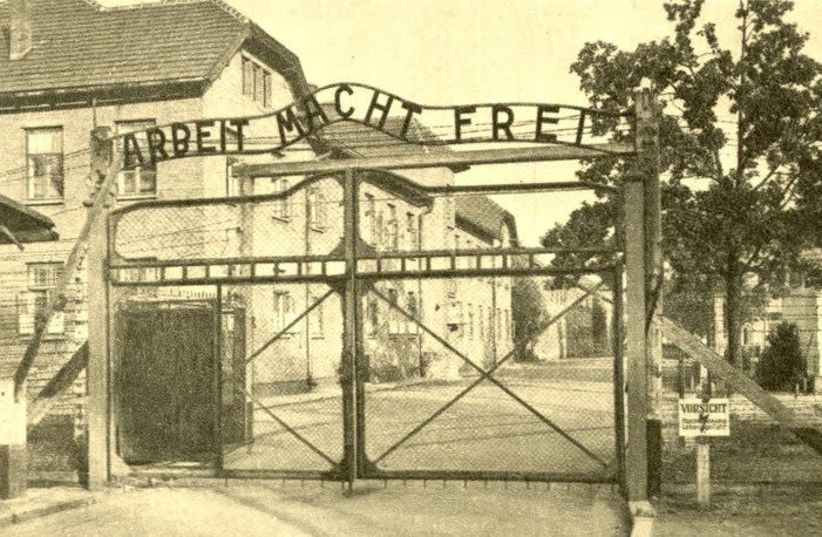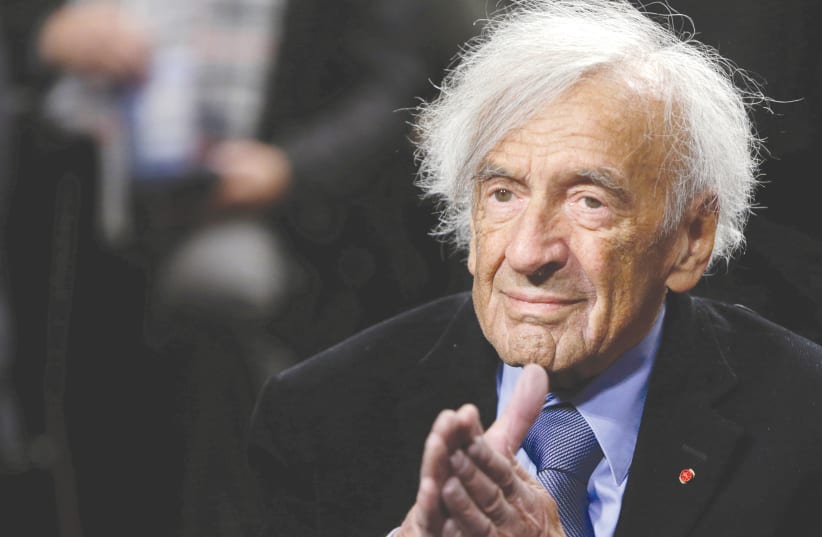Beware! It’s an attack of the stupids – Left and Right.
What’s more outrageous?
From the Right, a Texas educator decided that a new law directing teachers to teach “contending perspectives” on “controversial issues,” including the Holocaust, meant debating “did it happen – or not?”
From the Left, Boston University’s Elie Wiesel Center for Jewish Studies is hosting the Elie Wiesel Memorial Lecture Wednesday night – welcoming an activist who praises Palestinians’ “long history of nonviolence” while accusing Israel of “targeting” Palestinian children “simply because they want freedom.”
Debating whether the Holocaust happened is like debating whether the sun shines. And associating Wiesel’s name with a lying anti-Zionist is like giving Donald Trump a Martin Luther King bridge-building award.


“The really frightening thing about totalitarianism,” George Orwell warned, is “that it attacks the concept of objective truth; it claims to control the past as well as the future.”
Orwell fought top-down totalitarianism from the Nazi Right and the Communist Left; today’s totalitarianism is mostly bottom-up. Too many untruths, Right and Left, fester in a demagogic swamp of lies, distortions, stupidity and intolerance.
There aren’t “two sides” to the Holocaust – there are many sides. But the question isn’t “did it happen?” Incontrovertible evidence ranging from Mein Kampf to Auschwitz chronicles the Germans’ war against the Jews. Students should ponder many other compelling questions: Why did it happen? How guilty were most Germans? Who collaborated? Why did various Jews react as they did?
The Texas law, House Bill 3979, invites such thoughtful discussions; it condemns propagandizing. The relevant clause is clear: “teachers who choose to discuss... currently controversial issues” shall “strive to explore such issues from diverse and contending perspectives without giving deference to any one perspective.” The key word, “perspective,” addresses interpretation, explanation, not facts: it’s not whether the Holocaust, slavery, the American Revolution, the Alamo, happened – but why.
Similarly, the Israeli-Palestinian question has many sides, and pro-Palestinians could make honest, even uncomfortable criticisms. But idealizing Palestinians, conjuring some nonviolent tradition from their terrorism-addicted political culture, while demonizing Israelis, is as absurd as doubting whether Hitler mass-murdered Jews. Such flights from facts, such inversions and perversions, are the tics of the totalitarian. Regarding Jews and the Jewish state, they’re the tells of the Jew-hater.
Jew-hatred again emerges as the most plastic hatred. Hatred of blacks, while once ubiquitous, has become a most solid hatred, clearly defined, anchored rightward. By contrast, Jew-hatred is twistable, uniting Left and Right in shared bigotry.
WHAT TO do? Those of us who reject cancel culture, who resent totalitarians vacuuming through everyone’s past to judge them by their ugliest tweets, their worst moments, are stuck. We cannot tolerate such abuses – or such intolerance.
This column’s response has been to attack libels, not libelers – which is why I haven’t named the Texas (mis)educator or the Boston (mis)speaker.
The late Elie Wiesel’s family didn’t have that luxury. Showing remarkable grace, Elisha Wiesel explained that the family wasn’t involved in “the selection process” – BU’s first offense. Wiesel then refuted the “pernicious falsehoods – reminiscent of falsehoods broadcast from Christian pulpits in centuries past – that are deeply dangerous and harmful to the Jewish community.” Nevertheless, Wiesel graciously invited the activist to travel together to Israel “to review the reality on the ground,” while affirming the Wiesel family’s commitment to other issues the speaker cares about, including protecting voting rights and defending African-Americans.
The larger issue remains. In May, a fellow from the same Elie Wiesel Center signed her name to a pro-BDS petition calling Israel “a settler colonial state” championing “the racial supremacy of Jewish-Zionist nationals.” The scholar could have identified herself as being from Boston University. But her need to associate our beloved teacher’s name with those ugly lies was unconscionable.
Honorees and donors to BU – and every other university – beware. As Elie Wiesel’s family has learned the hard way, once you lend your name to an academic institution, you’re powerless. And in today’s perverse academic world, when Jew-hatred is so mainstreamed it’s often undetected, such profanations of sacred names will only proliferate.
To exorcise this ugliness, recall Elie Wiesel’s courageous article in Le Figaro in 1975, after the UN declared Zionism “racism.” With his survivor-scarred skepticism about labels, Wiesel had resisted calling himself a Zionist. But he could smell Jew-hatred, even when perfumed with human rights rhetoric. “Reproaches, condemnations, indictments by other nations – the plot is clear. It leads to public humiliation, the forced isolation of a people whose suffering is the oldest in the world,” he wrote.
He understood that “to prepare ‘solutions’ to the ‘Jewish problem,’ the first step was to divorce the Jew from humanity.” And anticipating today’s crisis among young Jews, he added: “To weaken us they attempted to distort our self-image.... We are told that it is not about Jews, this is about Zionists. That, too, is hardly new. They try to divide us, to pit us one against the other after having pitted us against the world.”
Rejecting this anti-Zionist con game demonizing his people, Wiesel declared, “I have no choice but to consider myself a Zionist. To do otherwise would mean accepting the terms of reference used by Israel’s enemies. I wish our non-Jewish friends would do the same, and claim Zionism as a badge of honor.”
I honor the Wiesel family for extending “a hand” to tonight’s speaker. May he and others embrace Elie Wiesel’s challenge: learn what Zionism truly is, stop using it as a curse word, and celebrate it “as a badge of honor.”
The writer is a distinguished scholar of North American history at McGill University and the author of nine books on American history and three on Zionism. His book Never Alone: Prison, Politics and My People, coauthored with Natan Sharansky, was published by PublicAffairs of Hachette.
